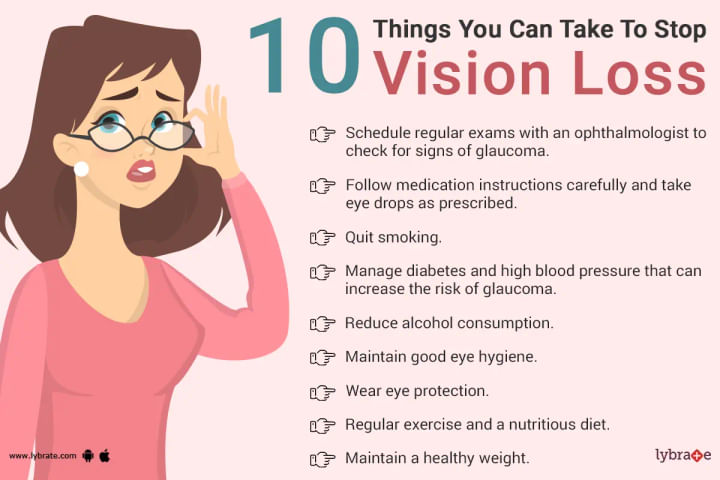10 Things To Do Today To Prevent Vision Loss From Glaucoma
What is Glaucoma?
Glaucoma is a category of eye disorders that induce optic nerve damage. It is estimated that approximately 60 million people worldwide are affected by it, and it is the main cause of permanent blindness. Fortunately, early detection and treatment of glaucoma can prevent major visual loss.
In general, glaucoma occurs when the pressure inside your eye (known as intraocular pressure) builds up and damages the optic nerve. It typically happens when fluid in your eye doesn’t drain properly, causing a buildup of pressure, or when too much fluid is produced by the eye’s ciliary body.
Glaucoma can run in families and can also develop as a secondary complication of other diseases, such as diabetes or hypertension. Age, being of Hispanic or African American race, having a family history of glaucoma, having higher than normal intraocular pressure in your eyes, and using steroids over an extended period of time are all risk factors for glaucoma.
What are the signs and symptoms of Glaucoma?
The following is a list of the most prevalent signs and symptoms of glaucoma:
- Gradual loss of peripheral vision (side vision).
- Seeing halos around lights.
- Eyes become red, sore or irritable due to increased pressure in the eye.
- Nausea and vomiting.
- Tunnel vision – only a small area is clear when looking straight ahead.
- Severe, sudden eye pain with nausea and vomiting.
- Optic nerve damage – appearing as darkened or blurred areas in the field of vision.
It is important to remember that glaucoma is often symptomless and can go undetected until permanent damage has already occurred. Because of this, getting your eyes checked on a regular basis is essential for early identification and treatment.
What are possible complications of Glaucoma?
- Peripheral vision loss: As it progresses, Glaucoma can affect peripheral vision, causing tunnel vision and eventually total blindness.
- Damage to optic nerve: Glaucoma can cause damage to the optic nerve which can lead to absence of a consistent visual response from the eye and overall vision deterioration.
- Color perception problems: Glaucoma can cause problems in color perception and difficulty recognizing colors correctly in dim lighting or low contrast situations.
- Fluctuations in intraocular pressure: Fluctuations in intraocular pressure (IOP) occur more frequently with glaucoma patients as compared to those without glaucoma, further affecting visual clarity and impairing ocular health over time if left untreated or managed improperly.
- Difficulty adapting quickly between bright/dim light levels: Those with glaucoma may have difficulty quickly adjusting when moving through bright (high luminance) environments into low luminance areas such as switching into dimly lit spaces such as rooms with minimal light after having spent some time outdoors on a sunny day
- Light sensitivity (photophobia): Photophobia is an intensely painful reaction manifesting itself under bright lighting conditions which may be accompanied by intense headaches often experienced by those with early stage glaucoma who fail to seek treatment promptly leading to the symptoms worsening over time if not treated accordingly.
10 Things To Do Today To Prevent Vision Loss From Glaucoma
- Make an appointment with your eye doctor for a comprehensive eye exam.
- When engaging in activities that could result in damage to your eyes, always make sure to wear protective eyewear (for example, contact sports).
- Stop smoking and/or limit alcohol consumption, as these can increase the risk of developing glaucoma or other eye conditions.
- Maintain a healthy weight range and diet rich in fruits and vegetables to help reduce your risk of high blood pressure, which can also contribute to vision loss caused by glaucoma.
- Take prescribed eye-pressure medications exactly as directed by your doctor; failure to do so may increase the chances of further vision loss from glaucoma progression.
- Engage in regular moderate physical activity, such as walking for 30 minutes a day; this supports overall health and helps reduce stress which can be beneficial for those with Glaucoma.
- Drink plenty of water and fresh fruit juices daily to flush out toxins from your system aiding in better circulation of your eyes.
- Follow an eye hygiene routine 2-3 times a day. This includes cleaning your eyes with lubricating eye drops or warm water, with a cotton swab in circular motion around the entire eyelids regularly.
- Practice relaxation techniques such as yoga or meditation - these have been proven to lower cortisol levels which have been linked to increased intraocular pressure (IOP ) - this can help reduce the risk or progression of glaucoma.
- Wear protective sunglasses when out in bright sunlight for extended periods of time to avoid damage from glare & UV rays for more protection against Glaucoma development & progression. Additionally any contact lenses used should be prescribed according to your needs specifically targeting corrective needs only without straining natural eye functions & cell/tissue health due to unknown artificial products/chemicals that may be potentially dangerous over long term use.
In the situation that the aforementioned remedies are unsuccessful, you may be required to think about surgical options.
What are the surgical treatments for Glaucoma?
Surgical treatments for Glaucoma are a number of procedures that can be used to reduce the eye pressure in the eye, which is a major factor in the development of glaucoma. The most common surgical treatments are trabeculectomy, laser trabeculoplasty and deep sclerectomy.
- Trabeculectomy: Trabeculectomy involves removing part of the trabecular meshwork in order to create a channel from inside the eye (the anterior chamber) directly out into the surrounding tissues. Because of this, fluid is able to move more freely, which lowers the pressure inside the eye and helps to preserve vision.The procedure typically takes less than an hour and does not require general anesthesia; however, it may cause discomfort and requires close follow-up with an ophthalmologist after surgery.
- Laser trabeculoplasty: Laser trabeculoplasty is an outpatient procedure used to treat glaucoma. During the procedure, a laser is used to create tiny burns along the trabecular meshwork (the eye’s drainage system) which help decrease fluid buildup, defining intraocular pressure levels (IOP). This lowers the IOP, decreases damage to the optic nerve and prevents vision loss associated with glaucoma. As a result of this procedure, patient's may be able to reduce or eliminate the need for certain glaucoma medicines.
- Deep sclerectomy: Deep sclerectomy is an ophthalmic procedure used to treat glaucoma. This procedure involves surgically creating a reservoir that connects between the anterior chamber of the eye and its surrounding tissue. By doing this, it reduces intraocular pressure and helps to slow or prevent further visual field loss caused by glaucoma. Deep sclerectomy is a simple procedure that can be performed within about 20 minutes and can help improve vision for people with glaucoma.
These procedures all carry some risks associated with them, such as infection or scarring, however they can provide some patients with lasting improvements in their vision and prevention of glaucoma development. Your doctor will ensure that you understand any risks associated with these treatments before proceeding with any procedure.
Best doctors to consult for Glaucoma?
-
For the best advice and treatment for Glaucoma, it is recommended to consult an Ophthalmologist or Optometrist who is experienced in treating Glaucoma.
-
Ophthalmologist: An Ophthalmologist is a medical doctor who has expertise in diagnosing and treating vision problems, including Glaucoma.
-
Optometrist: Optometrists are primary care doctors who specialize in detecting, diagnosing, and managing vision-related conditions including diseases such as Glaucoma.
-
Other healthcare professionals that may be consulted include opticians, contact lens specialists, and low vision specialists which may be helpful for post-diagnosis care of Glaucoma patients.



+1.svg)
